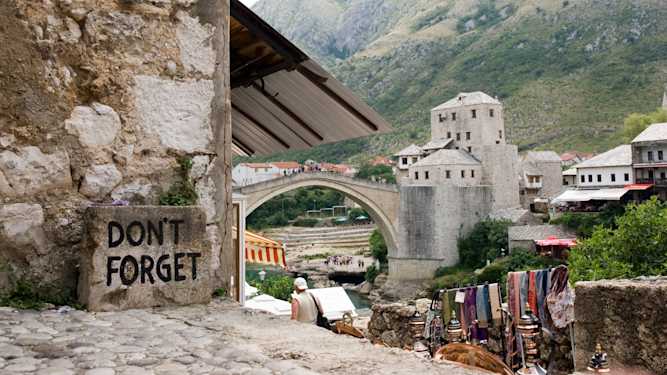
Bosnia 2025 - October
Throughout 2025, Ian Bancroft is collecting reflections on Bosnia-Herzegovina thirty years on from the end of the war. These reflections, supplemented by other insights and stories, explore various dimensions (peacebuilding, reconciliation, culture, education, politics), while reflecting on the past and the future.
To contribute your reflections on Bosnia-Herzegovina, please click here.
Read previous months here:
I spoke to an expert in migration to try to understand why people leave and come to BiH, including from faraway, war-affected places.
‘It's not just the economic situation that drives people out of the country,’ they contend, ‘but also this whole political battle which is still on, where we are still not sure if the country is gonna survive or not.’ ‘The situation remains unchanged for so many years,’ they insist, adding that ‘people want to have peace - they want to have prosperity.’
‘Why should I be a doctor in Sarajevo for €1,500 when I can do the same thing in Slovenia, Austria, or Germany for €5-6,000?’ they ask rhetorically. Their skills are in demand elsewhere.
‘We are stuck in the Catch 22 situation where no one wants to do what the EU is asking, especially the Serbs, who don't want to give up any of their jurisdictions,’ they reflect. ‘Nothing is happening - It's all these endless discussions,’ they tell me, adding ‘people are getting tired of it - they say, fuck, I’ve gotta go.’
With respect to the demographic situation, ‘I wouldn't say it's like, really, really bad, but it's bad,’ they believe, adding almost sardonically, ‘there are still people around.’
As in other countries, there is a trend of rural-to-urban migration. ‘Nobody wants to ride a tractor,’ they insist, ‘everybody wants to work with a computer in a nice office.’ ‘The rural area is a disaster,’ they contend, ‘and yet there are so many opportunities, so much potential, so many things that could be done - but people are scared to do any kind of business.’ They speak of a ‘Communist way of thinking’ that persists, where people wait for someone else to come and solve their problems.
Many of those who return to their homeland have found success elsewhere, though it is not a big trend. ‘Only those who really managed well, and they say, “Okay, let me do the same in Bosnia”,’ where labour costs are lower.
For Amina Agović-Argillander, an entrepreneur from Sarajevo who has a doctorate in law from the University of Helsinki, ‘BiH has shown that it can defend itself and survive even the most difficult trials in its modern history - including aggression and political blockades.’ These are words of defiance amidst contemporary tensions and uncertainties.
Institutions are weak and captured by ‘the narrow interests of political parties,’ while ‘corruption and nepotism have eroded a lot of what could have been a healthy fabric of society.’ ‘We should have built and strengthened a meritocratic system a long time ago, without fake and questionable academic degrees, without “faculty from all kinds of communities”, with clear standards for public service,’ she reflects.
‘Instead of politicians dealing with building a state based on knowledge and work, they have spent decades fighting for power, their own privileges and inequality of citizens,’ she regrets. Nonetheless, ‘it's never too late,’ she insists, placing her faith in ‘a new generation of well-educated people with ethical characters who are ready for honest work and not privileges.’
And yet BiH has endured. ‘Bosnia is one of the oldest states in Europe,’ Amina tells me; ‘Bosnia was and is now home to many peoples, cultures, and religions, with a culture of living together and mutual respect that has been developing for centuries.’ Despite what she calls ‘the neighboring imperialist ambitions over the past hundred years,’ the Bosnian people have ‘preserved their identity, culture, and memory.’
BiH has ‘a thousand-year history and a people who knew how to defend the country even when it seemed impossible,’ she reiterates, a fact that gives her conviction about the future.
‘It’s the economy, stupid!’ or so the adage goes. For Admir Čavalić from Tuzla, a member of the Federation Parliament, BiH has ‘had a stable and predictable economic growth rate of around 2% since the war.’ This is, however, ‘not enough to meet the needs and desires of the citizens of BiH.’
Economic transition has led to some parts of the economy, such as Sarajevo Canton, falling into the ‘Middle Income Trap,’ where ‘some kind of middle class is being formed’ but the economy struggles to progress into higher income bands. The rest of the country, however, is struggling to reach the same position. The labour market remains a key hindrance, with Admir maintaining that ‘importing labour is certainly a solution that no one wants to accept yet.’
It has long been hoped that economic development can create an environment in which contentious issues, including constitutional reform, can be more easily handled. Another Reform Agenda, this one now over a decade old, focused on structural economic reforms intended to unleash the potential of the BiH economy. Whilst there have been pockets of success, they have not proven sufficient to move beyond the political divisions that continue to obstruct reform.
For Admir, BiH’s institutes demonstrate what he describes as a certain ‘anti-fragility,’ arguing that ‘time is working in their favour, even if it may appear differently.’ ‘Crises are anticipated, accepted, overcome, and moved on from,’ he contends, arguing that ‘this was not the case before.’
Specific examples of dysfunctionality mean that, for Admir, the country is becoming ‘more similar to Belgium, Switzerland, and even the USA - blockade of the budget and financing.’ Gridlock is interpreted as a sign of maturity. ‘Crises become predictable and certain, which is a characteristic of complex political systems,’ he muses, adding that ‘institutions manage to function - sometimes at a minimum - in the midst of these crises.’ This makes him optimistic about the country’s future.
An anonymous source from the Armed Forces of BiH (AFBiH) believes that the Dayton Peace Agreement returned ‘the national status of BiH after 800 years - or, from other points of view, after 500 years.’
‘The Agreement returned legitimacy to the Bosnian state - which is at least 1,200 years old - after 500 or 800 years of occupation by foreign authorities,’ they add, arguing that BiH ‘regained its individuality.’
Despite the international community’s key role in this process [of uniting the armed forces], the source is critical of its stance, arguing that it ‘is not keen to have a real democratic state.’ It is a regularly heard complaint - that stability trumps genuine reform, even though the latter offers arguably the most reliable path to achieving the former.
In the face of foreign efforts to provoke ethnic or religious conflict, the source commends BiH for being ‘resilient enough to not let it happen.’ The country stood tall even as others tried to fuel division.
To contribute your reflections on Bosnia-Herzegovina, please click here.
You can also contact Ian directly by clicking here.
Ian is a writer based in the Balkans. He is the author of 'Dragon's Teeth - Tales from North Kosovo' and 'Luka'. Follow Ian on Twitter @bancroftian.
Currently in: Belgrade, Serbia — @bancroftian
